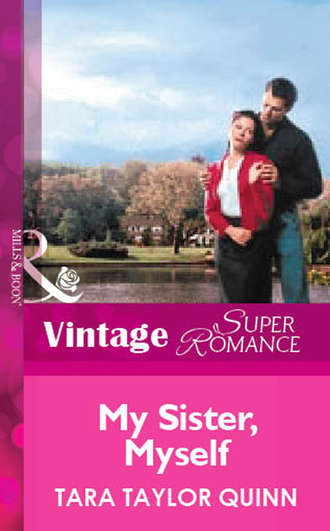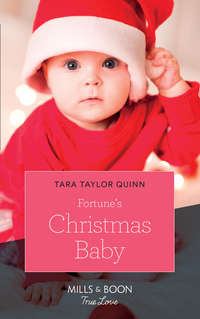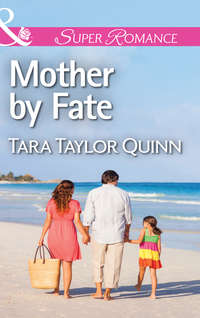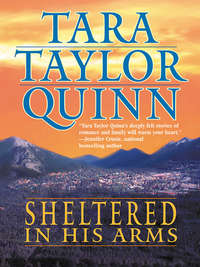
Полная версия
My Sister, Myself
“Yeah, come in.” Tory quickly pulled her bangs down over her forehead. After years of hiding bruises, the action was purely instinctive.
“Good morning.” Phyllis smiled, carrying a cup of coffee, which she set on Tory’s bedside table.
Being waited on in bed warmed Tory even more than the coffee Phyllis had brought.
They discussed trivial things for a while—the unbelievably hot Arizona weather, the pretty house Phyllis had found in August when she’d preceded Christine out to Shelter Valley. Also some of the people she’d met. People Tory would likely meet.
Trying to listen, to absorb, Tory settled for concentrating on Phyllis’s smile, instead, the steady cadence of her voice, the calm strength she emanated as she sat in the middle of Christine’s bed. Her nerves bouncing on the edge of her skin, Tory somehow made herself stay put, made her thoughts stay put. Forced down the panic inside her.
Phyllis was being so darn nice. Other than Christine, no one had ever been so nice to her before. And for no reason that she could fathom.
“We’re going to have to call Dr. Parsons and let him know Christine isn’t coming,” Phyllis finally said gently.
Here it comes, Tory thought, taking a deep breath.
She’d rehearsed the speech. A hundred times on her trek across the barren New Mexico and northern Arizona landscape.
Another deep breath, and still nothing happened.
She couldn’t do it.
“Life insurance was part of her benefits package,” Phyllis said, her eyes full of compassion. “I know Christine’s was already in effect because it was done at the same time as mine. We can give Dr. Parsons a copy of her death certificate, and at least you won’t have any financial worries.”
Tory stared at her.
“I’m counting on you to stay right here with me, just like we planned,” Phyllis continued. “Until you have time to decide what you want to do, anyway. It’s kind of lonely having an entire house to myself after living in an apartment for so long,” she said, obviously giving Tory whatever time she needed to enter the conversation. “I guess I need to hear life on the other side of my walls.”
“There isn’t one,” Tory stated bluntly.
Phyllis frowned. “Isn’t one what?”
“Death certificate.”
“But—”
“At least, not for Christine.”
“I don’t understand.” Phyllis was still frowning. “The hospital told you your sister was dead, but no one signed a death certificate?” Her face cleared. “If they haven’t seen her body, she may still be alive.” She looked at Tory. “Maybe Bruce has her, after all.”
Watching the expressions chase themselves across Phyllis’s face, Tory shook her head.
“The hospital authorities saw her.” She paused, swallowed. “I…saw…her.” Arms wrapped around her drawn-up knees, Tory stared down at the bed. “I had her cremated like she always said she wanted.”
Maybe most sisters didn’t talk to each other about their burials while still so young, but she and Christine had. With the lives they’d lived, the home they’d grown up in, death had been a constant possibility.
“You can’t do that without a death certificate.”
“I had one,” Tory admitted, biting her lip. “Just not Christine’s.” Her head hurt and her face was numb as she silently spun in the unending loop of terror inside her mind.
“Christine and I look so much alike….”
Chin resting on her knees, Tory studied the bed through blurry eyes. Tears dripped off her face, rolling slowly down the sides of her knees, but her voice was almost steady as she related what she’d been told so compassionately by the clergywoman who’d visited her in the hospital.
Tory’s bed sank on one side with Phyllis’s weight. She tried to concentrate on the comfort of the other woman’s hands rubbing slowly back and forth along her back.
“My driver’s license was brand-new. Christine’s was six years old….”
The hand on her back slowed, stopped moving, hung there suspended.
“We were both pretty messed up in the crash….”
“Tory—”
“She’d gotten cold, my monogrammed sweater was the only thing within reach for her to put on without stopping and—”
“Oh, my God.”
“When word got out that the woman who died in the crash was presumed to be Tory Evans, Bruce, who was apparently beside himself, sent one of the family staff to identify me. Her.”
“And the guy did?”
Tory nodded, turned to meet Phyllis’s incredulous eyes. “Christine went through the windshield,” Tory said, trying not to remember the one brief glimpse she’d had of her sister in the morgue. “Her face was barely recognizable, even to me. She’d just had her hair cut short like mine, said she was embarking on a new life and wanted a new look.”
Tory’s sigh was ragged. “Apparently when I first came to and they asked me if I knew who I was, I said Christine.” She looked at Phyllis again. “I can’t remember that at all, but knowing me, knowing how I get when I’m hurting, I would’ve been calling for Christine….”
Her sister had been her balm her entire life, as far back as Tory could remember. Which was pretty damn far. She’d been only three the first time her stepfather had thrown her against a wall. She could still remember the stars she’d seen. The confusion that had kept her immobile long enough for him to do it again.
“This is incredible,” Phyllis said. She took hold of Tory’s shoulders, turning Tory to face her.
“They think you’re dead, that you’ve been cremated.”
Tory nodded wearily, her eyes overflowing with tears. “The death certificate I have is my own.”
CHAPTER TWO
BEN LASTED until midway through Saturday morning. His ground-floor apartment was clean and quiet and comfortably furnished, but now he was at loose ends, and it was only ten o’clock. That was how long it had taken him to get his few pots and pans and dishes and glasses moved in and put away in the appropriate cupboards. And get his computer set up. He’d have done better if he hadn’t already put his clothes away and hooked up his stereo the night before.
He’d called Alex last night, too, thankful that she’d answered on his first try. The week before, he’d had to claim a wrong number three times before his daughter had been the one to answer his call. His daughter—not his daughter but the little girl he’d raised and loved as his own. Now that he had a number of his own, the subterfuge wouldn’t be necessary. He’d had Alex write down the number, complete with step-by-step instructions on how to call collect, and then made her repeat everything back to him several times. He’d given her his address, too, but didn’t expect her to be able to use it. At seven, Alex was bright enough to write him a letter and address the envelope, but she’d have to go to her mother for a stamp, and Mary would certainly deny the request. Ben wasn’t Alex’s real father—her birth father—though Mary had neglected to tell him so until recently. Now she wanted Ben out of their lives. Out of Alex’s life.
Damn her for putting Alex and him in this situation. Besides, the courts had said he and Alex should remain in contact, despite the fact that he was divorced from her mother and had no biological claim on her.
He headed out and spent an hour and a half at the local grocery store, stocking up not only on food but on every single household item he thought he might need at some point in his life.
Cleansers, a mop and bucket, sponges, a couple kinds of dishwashing cloths, several kitchen-towel sets, shoe inserts, extra laces and polish, bandages and antiseptic. Aspirin, cold tablets, cough syrup, paper towels. Toilet paper, tissues and a sewing kit, too.
Anything and everything that seemed to belong in a home, he bought.
The girl at the checkout made eyes at him as he went through.
“You new in town?” she asked with an appreciative smile.
“I am.” Ben glanced around for the name of the store, scribbling it on a check.
“Looks like you’re planning to be here a while.”
“Yes.” He signed the bottom of the check and waited for the total.
After a few more failed attempts to snare his attention, she finished ringing him up.
He was glad to collect his bags and be gone. The girl had been cute. Friendly. Twenty or twenty-one. If he’d met her in another life, he might even have smiled back at her.
But not in this life. At least not until he had his college degree and a career that satisfied him. He’d wasted eight years already. There were no more to waste.
After a brief detour to visit his great-grandfather, Ben was home again, slowly and methodically unloading his purchases. The first-aid stuff had to go in the bathroom medicine cabinet. Everyone knew that. And the kitchen towels in a drawer by the sink. One he draped over the oven door handle. He’d seen that on television once.
Down to just the sewing kit, he wasn’t sure where to put it. He finally settled on a drawer in the bathroom. Chances were, if he ever needed it, it would be when he was getting dressed and pulled off a button. Wouldn’t be much call for it otherwise. Sewing on buttons was about the only thing Ben could do with a needle and thread.
Not even noon yet, and he had a day and a half to kill before school started. Ben rearranged some things in the kitchen—and then moved them back to their original places, deciding he’d made the best choice the first time around.
George Winston’s Autumn piano music drifted through the apartment, but as he made one more trek from room to room to make sure there wasn’t anything more he could do, Ben felt the quiet—the absence of life—a weight pressing down on him.
He was used to noise—childish laughter and shrieks, blocks tumbling, play dishes being washed. And a woman’s whines trailing behind him with every step he took.
Ben got his keys again, and went back out to his truck. He had a home now. His own home. One where he’d be spending the next few years. Where he could call the shots.
It was time to get a dog.
“WHY DIDN’T YOU TELL the authorities they’d made a mistake? That Christine was the one who died in the accident?” Phyllis asked Tory later that morning.
She’d had a phone call earlier, and then Tory had asked if she could shower off the grime of the drive. She’d been too exhausted, mentally and physically, to do so the night before. When she’d come out of the shower, Phyllis had placed Tory’s suitcases on her bed and was standing by with an empty hanger, ready to help her unpack.
Now they were sitting at Phyllis’s kitchen table, the remains of a late breakfast neither of them had really wanted, or eaten much of, in front of them.
Why hadn’t she told the authorities? Tory had known the question was coming.
“I started to,” she said, sweating in spite of the air-conditioned kitchen. She was wearing jeans and a T-shirt, regardless of Phyllis’s warning about the Arizona heat, but it wasn’t the clothes that were making her uncomfortable. It was the task ahead of her.
She was about to find out just how insane she was. And what little chance her half-born hope of freedom really had.
“I fully intended to tell them, but when I opened my mouth, nothing came out. At first, everyone just figured I was too distraught to speak. Whenever I tried to tell them the truth, they’d tell me to get some rest, or they’d pat my arm and say they understood.”
Phyllis’s hand covered Tory’s. Tory gently pulled her hand away.
“Then it hit me,” Tory said, her gaze pleading as it met Phyllis’s. “As soon as I told them and word got out, Bruce would be right back on my tail. I only wanted a couple of days to rest, to think, to plan. So I let them think I was Christine. But as one day turned into the next, I couldn’t make myself become Tory again and…and take on all that fear.”
“I don’t know how you lived with it as long as you did.”
Tory smiled bitterly. “What other choice did I have?”
Phyllis moved the salt and pepper shakers. “So what are you thinking now?”
“That as long as I’m Christine, I’m safe.”
“Christine has a job to do starting Monday.”
“I know,” Tory said, her throat dry.
“Christine said you never finished college.”
“I never even went to college. Bruce didn’t want me on campus with all the college boys.”
Both women were silent, the words they weren’t speaking hanging in the air. How could Tory possibly be Christine? Christine was a college professor.
“You could always quit the job.”
“And go where? Do what? My résumé says I’m a professor.”
Every possibility had already occurred to Tory. She knew there was no way this could work. No way she could convince herself this was even a little bit right. She was just too weak to face the alternative.
“Bruce will probably keep tabs on Christine for a little while. If she’s alive, she has to be teaching college. Anything else will make him suspicious.”
“The bastard should be in prison.”
Tory couldn’t travel that road. If she did, her bitterness would destroy her.
“I have two choices,” she said, pushing congealed eggs around on her plate. “Either I come clean and spend the rest of my life trying to hide from Bruce and wearing his bruises every time I fail, or I show up at Montford University on Monday morning and teach English.”
She used to believe there was a difference between right and wrong. That for every situation there was a correct choice, the right choice. She’d even vowed, when her married life had first become a living hell, worse than the life she’d had growing up, to always make that right choice. She’d believed it would eventually deliver her from cruelty, from pain.
She didn’t believe that anymore.
“The boxes Christine shipped are in the closet in the spare bedroom,” Phyllis said. “I’m using it as an office.”
Tory watched the other woman scrape their uneaten food into the garbage, and then stack the two plates.
“Her lessons plans are in there,” Phyllis continued, speaking unemotionally, as though they were discussing nothing more serious than what movie they were going to see. “They’ll be clear, concise and very detailed. You’ve got thirty-six hours before school starts.”
Heart pounding, Tory said, “You don’t think I should even consider trying this, do you.”
Phyllis looked Tory straight in the eye, her expression grave. “I don’t see that you have any other choice.”
Tory held Phyllis’s gaze for as long as she could stand it, then dropped her eyes.
“What would Christine think?” she whispered, the guilt rising up to choke her. She should be dead, not Christine. She’d have gladly given her life if it meant saving Christine’s.
“She’s watching over you, Tory. Can’t you feel her?” Phyllis lowered her voice to a rough whisper, but the sharp conviction behind her words was unmistakable.
Tears in her eyes, Tory shook her head. She wanted so badly to believe that Christine was still with her. She could hardly even breathe when she thought about facing the rest of her life without her sister. But she couldn’t be sure of anything anymore. Did Christine really want her to do this? Or was Tory’s mind, influenced by her cowardice, playing some sick game with her?
“Christine told me once, not too long ago, that you were her only reason for living,” Phyllis said.
“You were the only good thing in or about her life.”
“She told me that, too, but she was just being kind. It didn’t really mean anything. How could it? She was an incredible woman, had the whole world at her feet.”
“She didn’t think so.”
The sincerity in Phyllis’s voice grabbed Tory, holding her until she had to admit that Phyllis might know more about her sister’s mental state in the past few years than she did herself.
“She would insist that you do this, Tory,” Phyllis said firmly. “And she’d want me to help you in any way I can.”
“WILL—DR. PARSONS—only met Christine once. Months ago. She’s had her hair cut since then. Lost some weight…”
The two women were in the bedroom Phyllis had turned into an office, sitting on the floor and surrounded by opened packing boxes. They’d been at it most of the day, Phyllis administering the fastest teacher-education course in history.
“Our eyes are what people notice most about us,” Tory said, trying, for Phyllis’s sake if nothing else, to get into the spirit of the plan.
“They’re beautiful,” Phyllis said gently. “So large and such a striking blue. But mostly so expressive.”
Tory leafed through the pages of the American literature anthology she held on her lap.
“They were one of the first things I noticed about Christine,” Phyllis added.
The familiar pang clutched Tory’s insides. “I’m so sorry, Phyllis,” she said, dropping a lesson plan for the third week of classes as she looked up. “I’ve been weeping all over the place about losing my sister, but you also lost a great deal, didn’t you? The way Christine talked about you, the two of you must have been very close.”
Tears brimmed in Phyllis’s eyes, but her ready smile was evident, too. “We were. Your sister was very special.”
Tory nodded, a measure of peace loosening the knots in her stomach. “I think you must be very special, too,” she said softly. “Do you know you’re the first real friend Christine ever had?”
“No,” Phyllis said, her eyes wide. “I know she was a private person, but as sweet as she was, I’m sure there were others who scaled those walls of hers.”
Scaled those walls. The words were threatening to Tory. She and Christine both had their walls. And the security in that was to think them unscalable.
“Our colleagues at the college all flocked to her,” Phyllis said. She was assembling materials for the fourth week’s lesson plan. “It must have been the same for her in college. You probably just never met any of her friends, since she was five years older than you.”
“She never had a friend,” Tory said with complete certainty.
Any chance of friendship had ended when they’d tried to report their stepfather’s abuse. Everyone had been shocked. Ronald was well-known in the community, soft-spoken, active at church. He’d carpooled. He’d protested his innocence, incredibly hurt by then-twelve-year-old Christine’s allegations. They’d been assigned a caseworker, but of course there’d been nothing to find. Ronald had simply not had anything alcoholic to drink during the weeks of the investigation.
And the confusing cruel truth was, when Ronald wasn’t drinking, he hadn’t been a bad father to them.
They’d been made to feel so ashamed of their complaints they’d begun to blame themselves for the abuse. They’d also lost all faith in the system that was purported to protect them.
“She lived at home when she went to college—probably because our stepfather wasn’t as rough with me when he had two of us to torment,” Tory said slowly. “Never once did she go out. Not on a date. Not to study. Nor did she ever have anyone over.”
Neither of them had. Neither had had the courage to risk bringing another person into their home. For that person’s sake. And for their own.
Bearing the violence privately was bad enough; to have it made known to others would have been intolerable. At least with no one else knowing, when they left the house, they left the violence behind. While they were safely at school, they were free. The real world was an escape neither of them had been willing to jeopardize.
“OKAY, THE FIRST THING to remember when you walk into the classroom is that you’re the boss.”
Exhausted, yet filled with nervous excitement, Tory sat on her bed, taking notes as Phyllis continued her crash course well past midnight Saturday night. They’d changed into their pajamas hours earlier, but hadn’t gotten around to turning in.
“You have to establish your authority immediately, and then you’re home free. The most important tool you’ll take into that class with you is confidence.”
“Kinda hard to be confident when they’re all going to know more about my subject than I do,” Tory said dryly.
“We’ll take care of that,” Phyllis replied, her entire body exuding positive energy. “Luckily you’re teaching five sections of American lit this semester. You’ll be teaching the same material five times, in other words. Now, we have all day tomorrow, to study the textbooks and Christine’s notes. For this next week, you only need to know Emerson and Thoreau, and you’re already familiar with a lot of that.” She was sitting on Christine’s bed, her legs crossed, her red hair framing her pretty face as though she’d just styled it an hour before, instead of the almost eighteen hours it had been.
“Christine said you were extremely intelligent. She said that when she was in college you used to help her study for exams, reading her texts and asking her questions from study guides. According to her, you’d often know the answers as well as she did.”
“Sometimes.”
“You must have a wonderful memory and a very acute, analytical brain.” Phyllis smiled. “Christine mentioned that you had some pretty stirring debates and some real differences of opinion. You’re obviously a natural.”
“Hardly,” Tory said, but she warmed at the compliment.
Phyllis twisted the opal ring she wore on her right ring finger. “Have you ever had your IQ tested?”
“No!” And Tory had no intention of doing so.
“I’d hate to find out that I’m not as smart as I think I am.”
“What if you found out you were smarter?”
Tory was silent for a moment, wondering if her numbed mind was going to take in everything it had to in the next twenty-four hours. “I think I’d hate that, too,” she admitted softly. “Because then I’d know just how much I’ve wasted, how much I’ve lost.”
“Hey,” Phyllis said, unfolding her legs as she reached across to squeeze Tory’s hand. “It’s not too late. You’ve got a whole new life ahead of you. Amazing things to accomplish.”
Tory smiled, but inside, the familiar dread was spreading. Yeah, she had a whole new life.
It just wasn’t her life.
BEN WAS IN THE KITCHEN of his two-bedroom apartment, paper towel in hand, when his alarm went off Monday morning.
“Okay, little buddy, you and I need to get some things straight,” he said, leaving the puddle in the kitchen as he scooped up the puppy and strode back to the master bedroom to turn off the alarm.
“I’m the boss in this house and what I say goes, got that?” He kept the puppy firmly under his arm, out of harm’s way, off the carpet, and with those big imploring brown eyes out of his line of vision. Ben had been implored so much in the past two days—and had given in so often—he was making himself sick.
“When I say it’s time for bed, bedtime it is.” He continued the lecture as he headed back to the mess awaiting him in the kitchen. “That means I lie down, you lie down, and we both sleep. There will be no barking.” He stepped over the gate he’d put up across the kitchen doorway. “No whining. And if—that’s a big if—I deign to take you into the bedroom with me, there will be no more biting on the ears.”
Dropping the wad of paper towels on the puddle beneath the kitchen table, Ben soaked up the deposit, threw the towels in the special trash bag that would leave the house with him that morning, poured a generous amount of disinfectant on the soiled spot and with another wad of paper towels mopped that up, too.
Only then did he put the puppy down. One set of urine-wet paw prints traipsing across the floor was enough for him. He was learning quickly.
Buddy, which was what Ben had called the dog so far, darted around puppy-style, falling as much as he ran, coming to rest suddenly by a leg of the kitchen table.
“No!” Ben hollered, grabbing him up before more damage was done. He took the puppy out the sliding glass door off the kitchen and out into the yard, where the little guy did his business. Ben was pleased. Between the two of them, they’d gotten it right that time.
Yes, Ben praised himself, all in all, the training was coming along nicely.









